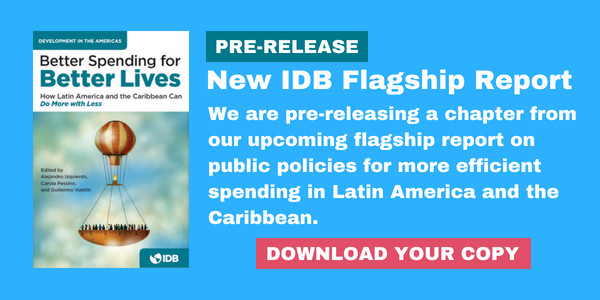Faced with soaring drug prices, officials in the United States are taking on the pharmaceutical companies, desperate to stop the hemorrhage of up to thousands of dollars a month in family income towards prescription drugs. Individual states in just the last year have passed 37 drug laws, conscious that current trends are unsustainable.
But the United States is not alone in feeling the bite of rising prices. Latin America and the Caribbean also is caught in the rising spiral, where escalating drug costs deplete resources for expanding health access and improving health care quality. Indeed, the growth in pharmaceutical spending in Latin America and the Caribbean—at around 12% annually between 2013-2017—was four times faster than in North America and six times the rate in Europe.
Fragmented decision-making in Latin America and the Caribbean
As we indicate in an advance release of the IDB’s upcoming flagship report Better Spending for Better Lives, weak institutions and regulatory frameworks are largely to blame. Many countries in Europe have a centralized agency, like the National Institute for Clinical Excellence in the United Kingdom, that does technology assessments to determine which drugs are most cost-effective and which ones should be reimbursed with taxpayer money. In Latin America and the Caribbean, by contrast, this process is fragmented. A multiplicity of actors makes uncoordinated decisions in a wide range of areas so that there is little clarity for doctors, pharmacists and patients as to the safety and cost-effectiveness of drugs and the clinical guidelines for appropriate use.
Consider the widespread use of Ertapenem, an antibiotic used to treat in-hospital bacterial infections. Ertapenem is not on the World Health Organization’s list of essential medicines and is not recommended as a first-line of treatment. There are much cheaper drugs with similar clinical effects. But because technology assessments and clinical practice guidelines for the drug have not been done in some countries, money is being wasted. Colombia, a country which has not engaged in either technology assessments or clinical guidelines, spends 16 times more per capita on the drug than Costa Rica and 12 times more than Peru, countries which, by contrast, have carried out at least some form of evaluation and use the drug much less. Another glaring example comes from the use of insulin glargine, an insulin analogue employed to treat diabetes. Its widespread use continues despite the fact that it can be up to 120% more expensive than human insulin, which provides similar benefits.
Generics could bring drug prices down
The failure to take advantage of generic drugs is another major problem. Generics have the same effect as brand products and usually cost considerably less. But, unlike in Europe, Latin American and Caribbean countries use few financial and regulatory incentives to encourage their use. We looked at a sample of eight countries: Chile, Colombia, Costa Rica, Dominican Republic, Ecuador, El Salvador, México and Peru. Among them, Colombia applies lower tariffs; Mexico offers tax exemptions and El Salvador financially supports technological upgrades in small- and medium-sized pharmaceutical companies that produce them. Yet in our sample these countries are exceptions. In some European countries, pharmacists have an obligation to tell their patients that a cheaper alternative to a medicine exists and may receive a bonus for selling a generic as opposed to a brand name drug. None of the countries in our sample, however, do this, and, in the process, lose out on the immense savings that generics have to offer.
A big benefit in centralized negotiating and purchasing of drugs
To their credit, several countries have figured out that centralized negotiation and purchasing of drugs can give governments better bargaining power with pharmaceutical companies, while eliminating the inefficiencies in low-scale purchasing that come when each health organization buys its own supplies. Some countries negotiated high-cost medications for cancer in large blocs through Mercosur or Unasur. And some compare the price of medicines in other countries and use this reference to establish their own price.
Still the overall picture is of a region that could make significant improvements towards better regulatory and financial incentives for using the most cost-effective drugs, while moving towards more rational drug prescribing and use. In health systems rife with excessive costs that affect the overall health of the citizenry, nearly half of the leading sources of inefficiencies are related to medicines. That shouldn’t be.



Es un buen planteamiento para evitar el encarecimiento de medicamentos en America Latina. Lo que temo es que realmente el poder politico y economico de los grandes laboratorios permita estas opciones o alternativas que permitan lograr abaratar costos